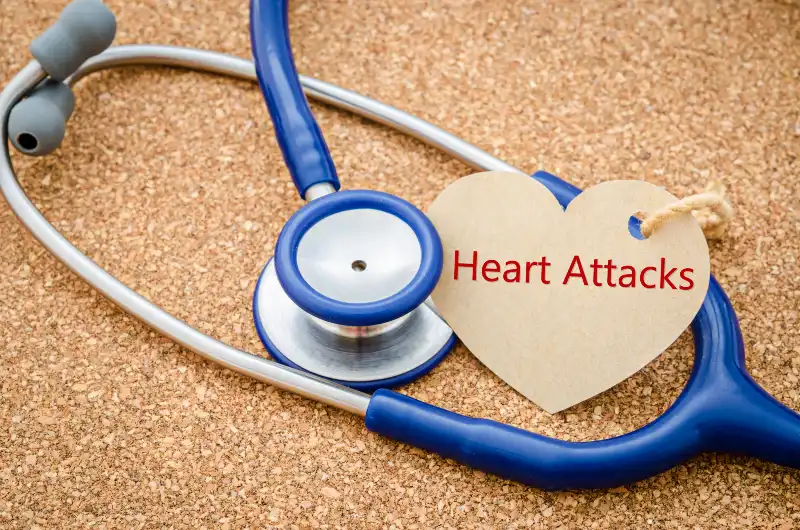You may have heard that the rate of heart attacks among young people under 40 is on the rise. So what causes a heart attack at a young age?
According to Harvard Health, there are several risk factors that can lead to a heart attack at an early age. These include lifestyle choices such as lack of nutrition, smoking, high blood pressure, cholesterol levels, diabetes, obesity, and lack of physical activity.
Meanwhile, genetic factors like a family history of early heart attack, mental health conditions like stress, anxiety, depression, and low income can all contribute to a high chance of heart attack in young people.
Contents
What Causes a Heart Attack?
A heart attack occurs when the flow of oxygen-rich blood to a section of the heart is blocked. The most common cause of a heart attack is coronary artery disease, where fatty deposits accumulate in the vessels and reduce or block blood flow.
That’s why it’s sometimes referred to as a “coronary event.” Other causes of a heart attack include conditions that make it difficult for the arteries to expand (atherosclerosis), spasms in the arteries, blood clots, and damage or injury to the heart muscle.
Understanding the causes of the rise in heart attacks among young adults can help you take precautions to cardiovascular disease.
1. Lack of Nutrition
Some young adults eat a lot of junk food, which increases their rate of heart attacks.
A healthy, balanced diet is key to reducing your risk of a heart attack at a young age.
Eating foods with more fiber and less saturated fat and sodium can help reduce cholesterol levels and lower the risk of a heart attack. Fruits, vegetables, whole grains, lean proteins, and fish are all good sources of nutrition that help keep your heart healthy.
2. Smoking
Smoking cigarettes and vaping can both lead to a heart attack at an early age. Nicotine and other toxic substances in cigarettes can make blood thicken and clot in veins and arteries. Such a clot blockage can cause a heart attack and even sudden death.
3. High Blood Pressure
Your ideal blood pressure is less than or equal to 120 (systolic) over 80 (diastolic) mm Hg. When your blood pressure is too high, it increases the workload of your heart and damages arteries in other parts of the body. This can lead to an increased risk of a heart attack.
4. Cholesterol Levels
There are two types of cholesterol – LDL ( low density lipoprotein) and HDL (high density lipoprotein). The higher your LDL, or “bad” cholesterol levels, the greater your risk for a heart attack as High LDL can restrict blood flow, raising the risk of a heart attack or stroke.
5. Diabetes
Diabetes increases a person’s risk of heart disease and stroke by two times compared to someone without diabetes. Diabetes can damage the arteries and affect how well your heart pumps, which increases the risk of a heart attack.
The high sugar level in your blood will make your blood vessel walls less elastic and more prone to narrowing due to plaque buildup. This can result in a heart attack at an early age.
6. Obesity
Obesity alone can increase the workload of your heart, which can lead to a heart attack.
Further carrying extra weight increases the risk of developing other health conditions such as high blood pressure, diabetes, and high cholesterol levels – all of which can increase your chances of having a heart attack at a young age.
7. Lack Of Physical Activity
You can lower your risk of a heart attack by being physically active. Exercise helps to improve your health in many ways and can help lower LDL cholesterol, control blood pressure, and reduce stress. These are all factors that can contribute to the risk of a heart attack at a young age.
It is recommended to have 30 minutes of physical activity 5 days a week. This can be simple activities such as jogging, walking, or swimming.
8. Stress And Anxiety
High levels of stress and anxiety can contribute to an increased risk of a heart attack at a young age. Stress and anxiety can affect the body in many ways, including increasing blood pressure and heart rate, which can put a strain on your heart and lead to a heart attack.
You need to find ways to manage stress levels such as getting regular exercise, yoga or meditation, swimming, running, having regular breaks away from work, and making time for activities that you enjoy.
9. Depression
Depression is more serious than stress and anxiety, and can also increase your risk of a heart attack at a young age. Depression can affect your ability to take care of yourself by reducing your motivation to exercise or eat a healthy diet, two important factors in keeping your heart healthy.
If you are feeling depressed or anxious, it is important to seek help from a mental health professional.
10. Family History of Early Heart Attack
If there is a history of a heart attack in your family at a young age, you may be more prone to having a heart attack yourself.
It is important to talk to your doctor about any family history and discuss ways to reduce your risk.
It is also important to get regular check-ups with your doctor, maintain a healthy lifestyle, and be aware of the signs and symptoms of a heart attack.
By taking these steps you can help lower your risk of having a heart attack at a young age caused by genetic reasons.
11. Low Income
According to Yale, Low-income young individuals may be more likely to have a high risk of a heart attack because they lack access to healthcare, especially young women as they earn less than men but need to look after children.
This can lead to a lack of preventative care and treatment, which can increase the risk of a heart attack at an early age.
